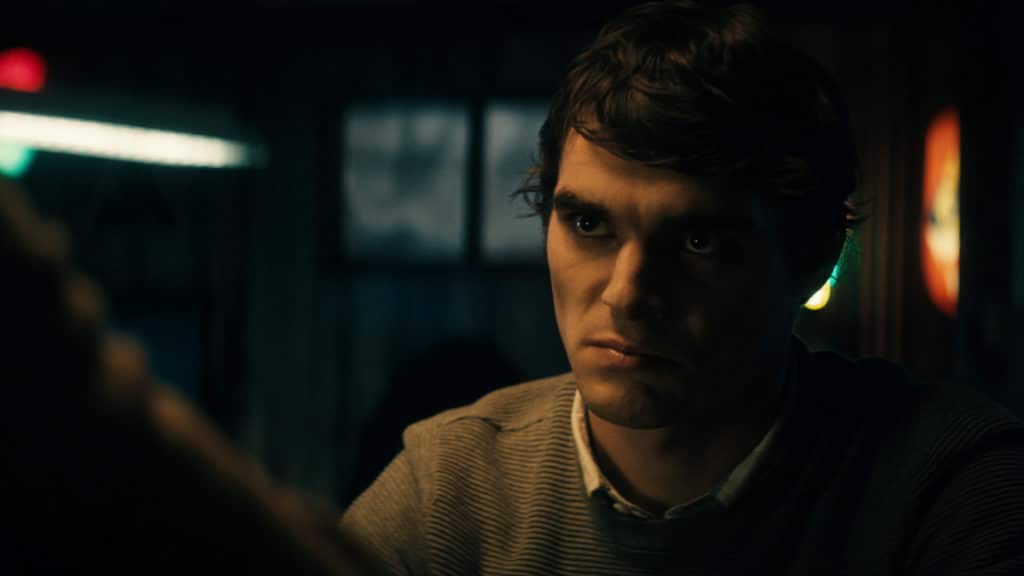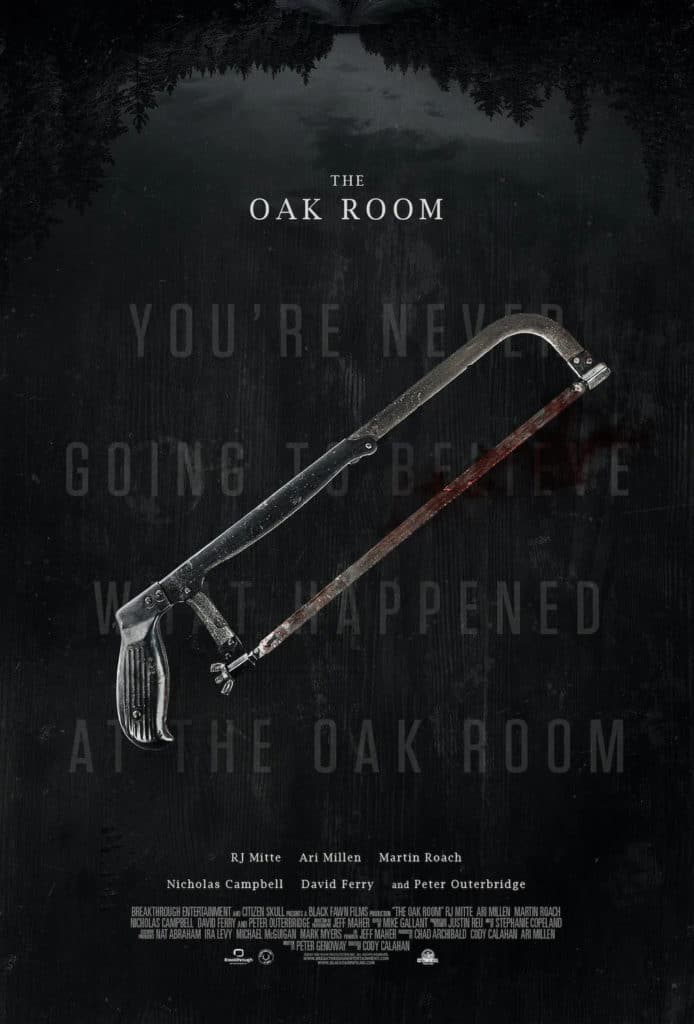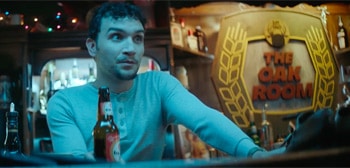
A bar – it could be any bar, albeit it seems to be in a particularly bleak, remote place. It’s snowing outside. A beer bottle, not quite drained, occupies the foreground; unseen but audible, it seems a violent attack is taking place in the background. This first few minutes of coverage sums up a great deal about The Oak Room by showcasing its selected setting, its promise of violence and its resistance to neat, wrapped-up endings: it’s significant that this beer isn’t completely finished but we can still fill in the blanks as to what may be happening here, because we are hardwired to fill in those blanks.
We remain in a bar – the same bar? A different bar? You have to wait to find out, but it’s closing time, and bartender Paul (Peter Outerbridge) is just about ready to lock up for the night when a figure appears, out of the snow, and won’t take no for an answer when he’s told to go. Turns out it’s a local guy, Steve (Breaking Bad’s RJ Mitte) – well, he was local, but he moved away to college and never came back, not even for his father’s funeral. Paul, a lifelong friend of his dad, makes it quite clear that however unwelcome he was to begin with, it’s now doubly so. To compound this, it seems that Steve owes a lot of people, and as he’s here, he needs to clear the debt. Instead of simply paying up, Steve makes an offer: how about he tells a story? It takes place in a different town and a different bar, called The Oak Room, but he assures Paul that he’ll want to hear it. And so we begin: narrative frames narrative frames narrative, with humour, pathos and violence as common threads which hold these stories together.

Handling its selected structure very well and taking no easy linear routes, The Oak Room is, in its own way, an ode to the power of storytelling. Not only does Steve join the ranks of hundreds of literary figures who tried to tell a good tale as a means of getting out of a tough situation, but the film offers up something of a debate about stories themselves; I guess you could call that ‘meta’, if you liked, but in the film characters squabble about the rights and wrongs of how to tell a good yarn, what to emphasise, what to omit, how to get through the beginning, middle and end, and so on. It’s nice, too, that bars and barkeepers figure so highly. At the time of writing, bar-hopping as we know it feels like a distant memory: there’s a particular kind of storytelling in that environment – in which basic truths figure, but not as a priority – which deserves this kind of engaging, knowing tribute. As to what the stories reveal, it has an interesting effect; by drawing away from the first two characters we meet, it adds layer upon layer of circumstances which may, or may not be relevant to that initial situation. But because the stories are told so well, and mesh together so well, it winds up being a particularly rich way of developing the film’s plot – one which is closely geared towards people’s natural tendency to follow stories, and remember them. The film is based on a play and it does retain that feeling of an intimate stage setting, one which depends on guiding the audience.
I would say that the initial acting between the two leads took a little time to get used to; Paul seems rather overblown compared to Steve at first, drifting close to an 80s ‘action guy’ vibe with the sardonic, humorous dialogue to match. But either this was dialled back a little as the film progressed, or I stopped noticing it so much. In any case, it is entertaining, and the other characters who come along seem to reflect that same mismatch in turn, so it feels balanced. And the film feels variously like a game of cat and mouse and then a battle of wills, whoever is on screen: it’s no mean feat to hold the interest so well, given there are never more than two people on screen at one time (with a couple of minutes’ exception). The script jogs along, doing what it does economically enough but making you suspect each character’s motives in turn and the cast is excellent, though you could argue that RJ Mitte and Ari Millen are particularly good – and well-matched, too, despite the fact that they actually (spoiler) share no screen time. I’ve only recently become acquainted with Millen via his star turn in Vicious Fun and I have to say – he’s a force of nature, and definitely an actor to watch. Likewise, director Cody Calahan, also of Vicious Fun: to make and release two films of this calibre inside a year is quite a feat.
Woven into these unfolding tales are some big-hitting topics, as we touch upon generational conflict; past vs present; poverty; the repercussions of cruelty and human failure. I found the whole thing incredibly engrossing and appealing. Something else to note, and again, apologies for the minor spoiler: there are no women in this film. And that’s fine! Not every story, not every conversation has to contain women. The Oak Room does more than enough in grappling with bigger concerns which transcend this as an issue. This is a careful, cleverly-done film which balances the humane with the inhumane: it’s impressive and as charming as it is unsettling.
The Oak Room will available on digital download from 26th April.
